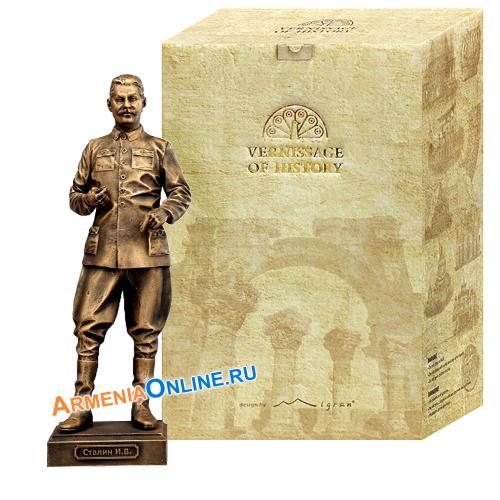Сталин Иосиф Виссарионович
Цвет Бронза
Высота статуэтки: 30 см
Вес статуэтки: 0,8 кг
Размер коробки: 42х20х15 см
28-го апреля
- Доставка по Москве курьером
- Экспресс-доставка по Москве
- Самовывоз
- Доставка по МО
- Доставка по России ТК
- Доставка по России курьером
Сталин (Джугашвили) Иосиф Виссарионович Сталин – государственный, политический, партийный и военный деятель Советского Союза, революционер. Верховный главнокомандующий, Генеральный секретарь ЦК ВКП; Секретарь ЦК КПСС. Генералиссимус Советского Союза, Герой СССР, кавалер двух орденов «Победа». Родился 21 декабря 1879 года в городе Гори, Тифлисской губернии. Эпоха правления Сталина – это период, который характеризуется рядом важнейших событий в истории Советского Союза. Сельское хозяйство активно механизировалось. Проходила ускоренная индустриализация, создавались многочисленные промышленные объекты, которые дали толчок превращению СССР из отстающей аграрной в индустриальную страну. Советский Союз превратился в ядерную державу, нарастил военный, научный, промышленный потенциал. Усилилось геополитическое влияние СССР во всём мире. Одержал победу над Германией во второй мировой войне. Вместе с тем, не следует забывать и о негативных сторонах сталинского правления: голод, связанный с насильственной ускоренной коллективизацией, установление жёсткой диктатуры, репрессии, огромные человеческие потери в войне из-за отсутствия опытных военачальников. Сталин считается одной из самых известных личностей XX века, оценка его действий на посту руководителя Советского Союза крайне неоднозначна.
Stalin (Dzhugashvili)
Joseph Stalin - state, political, party and military leader of the Soviet Union, a revolutionary. Supreme Commander, Secretary General of the Central Committee of the CPSU; Secretary of the CPSU Central Committee. Generalissimo of the Soviet Union, Hero of the USSR, gentleman of the two orders "Victory". Born December 21, 1879 in the city of Gori, Tiflis Province. The epoch of Stalin’s rule is a period characterized by a number of important events in the history of the Soviet Union. Agriculture was actively mechanized. Accelerated industrialization took place, numerous industrial facilities were created, which gave impetus to the transformation of the USSR from a lagging agrarian into an industrial country. The Soviet Union turned into a nuclear power, increased its military, scientific, industrial potential. The geopolitical influence of the USSR throughout the world increased. He defeated Germany in World War II. At the same time, one should not forget about the negative aspects of Stalin's rule: the famine associated with violent accelerated collectivization, the establishment of a rigid dictatorship, repression, huge human losses in the war due to the lack of experienced military leaders. Stalin is considered one of the most famous personalities of the 20th century, his assessment of his actions as head of the Soviet Union is extremely ambiguous.

.jpg)
- Комментарии










